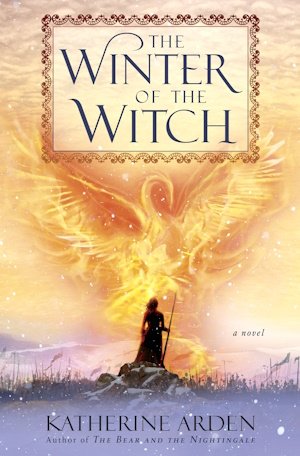“I was taking her to a convent,” lied Sasha. “The Grand Prince desired it of me. Our train was set upon by robbers; we were left alone, without succor. They tore her dress; they left us with nothing, save what you see. We wandered hungry for some days, saw your fires and came. We thought to receive help, not indignities.”
“It puzzles me, though,” said Chelubey with acid irony. “Why is the nearest adviser of the Grand Prince of Moscow taking his sister to a house of religion at such a time?”
“I advised Dmitrii Ivanovich against going to war,” said Sasha. “In anger, he ordered me from his side.”
“Well,” broke in Mamai briskly, “if that is so, then you will have no difficulty informing us of your cousin’s intentions and dispositions, so you can get back to praying.”
“I know nothing of Dmitrii’s dispositions,” said Sasha. “I told you
—”
Chelubey backhanded him across the face, hard enough to send him to the floor. Vasya cried out and threw herself at Chelubey’s feet, getting in his way before he could kick Sasha in the stomach.
“Please,” she cried. “Please, don’t hurt him.”
Chelubey shook her off, but stared frowning down as she knelt before him, hands clasped. Vasya would never be taken for a beautiful woman, but her bold bones and vast eyes caught the gaze somehow, and held it. Sasha, his lips bleeding, was disturbed to see the men’s attention once more on her, in a way it hadn’t been before.
And she was encouraging them, damn her, to keep them from him.
“Forgive me,” said Chelubey calmly, “if I don’t believe your brother.”
“He has only spoken the truth,” she whispered, her voice small.
Mamai turned abruptly to the Russian. “What say you, Oleg Ivanovich? Are they lying?”
The Russian’s bearded face was quite inscrutable, but Sasha recognized the name. The Grand Prince of Ryazan, who had sided with the Tatar.
Oleg pressed his lips together. “I cannot say if they’re lying. But the monk’s tale seems more likely than not. Why would Dmitrii Ivanovich send two of his own cousins to spy, and one a girl dressed as a man?” His glance at Vasya was wholly disapproving.
“She is a witch; she has strange powers,” insisted Chelubey. “She made our campfire burn unnaturally; she bewitched my horse in Moscow.”
All eyes went to Vasya. Her gaze was unfocused; her lips trembled.
Blood still welled from the cut in her head, and a lump was forming.
She was crying softly.
“Indeed,” said Oleg after a telling silence. “She is a fearful sight.
What is the girl’s name?” The last was in Russian.
Vasya looked blank and didn’t answer. Chelubey raised his hand once more, but Oleg’s voice caught him before the blow fell. “Do you strike bound girls now?”
“I told you,” said Chelubey, angry. “She is a witch!”
“I see no evidence of it,” said Oleg. “I will add that it is late, and perhaps we can determine their fate in the morning.”
“I will occupy myself with them,” said Chelubey. In his eyes was an eager light, the memory of Moscow’s humiliations fresh. Perhaps he was curious about the green-eyed girl who dressed as a boy. Perhaps he’d even been there, on the river that day, when Kasyan exposed her secret before all Moscow, in the cruelest way possible. “Dmitrii Ivanovich will ransom her,” said Sasha. “If she is unharmed.”
They ignored him.
“Very well,” said Mamai. “Occupy yourself with them and tell me what you learn. Oleg Ivanovich—”
“The Metropolitan will have something to say if he dies under torture,” said Oleg. Sasha took a steadying breath.
“See that he lives,” Mamai added to Chelubey.
“General,” Oleg said to Mamai, his eyes on Vasya once more, “I will keep the girl with me this night. Perhaps, separated from her brother, alone and afraid, she will say more to me.”
Chelubey looked put out. He had his mouth open to speak, but Mamai forestalled him, looking amused. “As you like. Skinny though, isn’t she?”
Oleg bowed and hauled Vasya to her feet. Vasya hadn’t understood most of the conversation as it had been largely in Tatar. Her eyes locked on Sasha. “Don’t be afraid,” he said.
Cold comfort. She wasn’t afraid for herself; she was afraid for him.
27.
Oleg of Ryazan
OUTSIDE MAMAI’S TENT, OLEG HISSED between his teeth. Two armed men appeared and followed them. They looked Vasya over curiously, before schooling their faces to blankness. She was terrified for her brother. It had all happened too fast. Midnight might mock and threaten, but Vasya had never dreamed that her great-grandmother’s servant would betray her to the Tatars. Why, in God’s name?
You failed, Midnight had said.
Oleg pulled her onward. She tried to think. If she could get herself away, could she come back for her brother at the next day’s midnight? In this great camp, face sticky with blood, magic seemed as distant as the uncaring stars.
Another round tent, smaller than Mamai’s, loomed out of the dark.
Oleg thrust her through the flap, followed her in, dismissed his dubious-looking attendants.

























